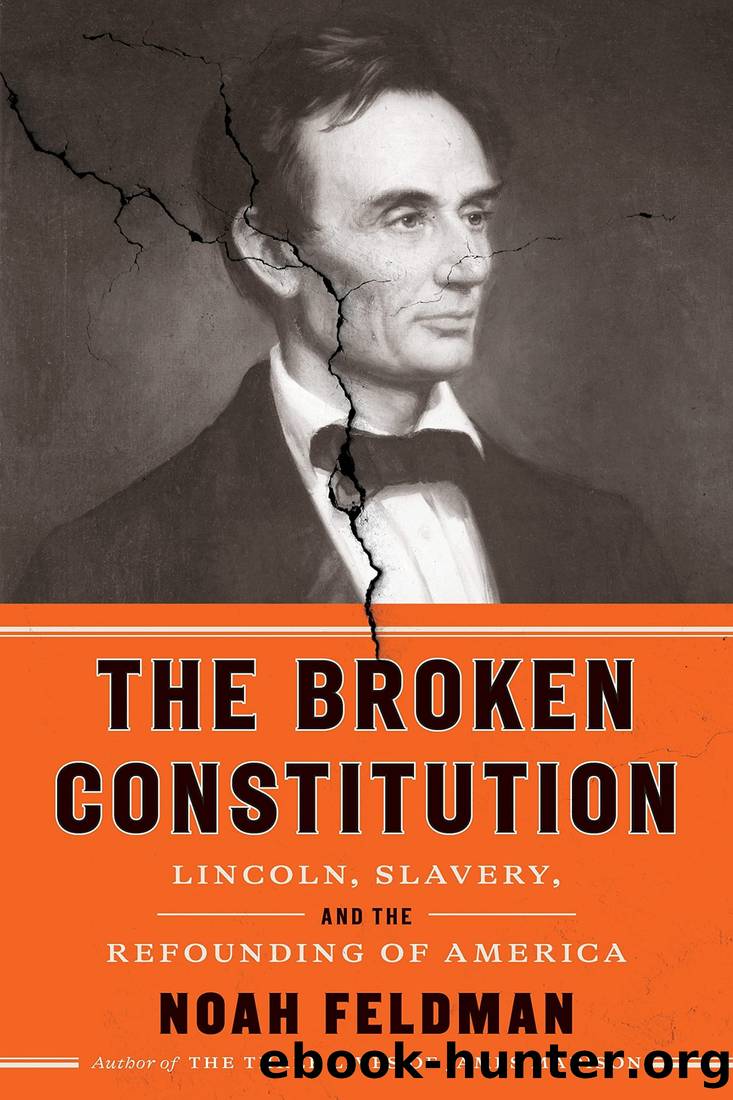The Broken Constitution by Noah Feldman

Author:Noah Feldman [Feldman, Noah]
Language: eng
Format: epub
ALL THE LAWS BUT ONE
After Taney issued his opinion in Ex parte Merryman, Lincoln could have backed down and transferred Merryman to civilian custody for trial. He had been careful not to announce a general suspension of habeas corpus, preferring to direct his generals privately that they could suspend habeas if necessary for public safety. That in itself suggested that Lincoln was not fully committed to suspensionâand it gave the president substantial leeway. He could, for example, have told the generals to stop the suspensions or to dial them down. Taney had intentionally left Lincoln some room to retreat gracefully, writing that âit is possible that the officer who has incurred this grave responsibility may have misunderstood his instructions, and exceeded the authority intended to be given him.â34 This was an invitation to Lincoln to disown the actions of the officers who had detained Merryman.
Before Taneyâs opinion, it would seem, Lincoln might possibly have been open to this option. On May 17, a week before Taney announced his opinion, Lincoln had received a letter from the U.S. attorney in Washington, D.C., protesting the fact that the military was making arrests on its own in the city, outside the sphere of civilian authority. In a memorandum that may have been directed only to himself, Lincoln had jotted down one sentence: âUnless the necessity for these arbitrary arrests is manifest, and urgent, I prefer they should cease.â35 The language suggests that Lincoln had not yet fully embraced the policy of military arrests he had set in motion.
Yet once Taney had personalized the attack on Lincoln, the president seems to have decided to double down. On May 30, he renewed his request to Edward Bates, the attorney general, to give him a formal opinion on his authority.
Lincoln did not have faith that Bates could do the job without help. He may have known that Bates had asked for assistance on the issue from one of his own sons, a lawyer, and from Titian J. Coffey, a Pennsylvania attorney. Coffey had concluded that only Congress could suspend habeas36âexactly the opposite of the conclusion that Lincoln wanted. Bates also knew, and Lincoln must have known, that the same conclusion had been reached in 1857 by Caleb Cushing, then Buchananâs attorney general.37
So this time Lincoln directed Bates to get input from Reverdy Johnson, a Maryland lawyer and politician who had been attorney general under Taylor and Fillmore and who had represented the slave owner in the Dred Scott case. The tone left no doubt that Lincoln expected his attorney general to authorize his actions. âWill you do the favor to confer with Mr. Johnson,â Lincoln wrote, âand be preparing to present the argument for the suspension of the Habeas Corpus.â38 Lincoln must have been told that Johnson had different ideas on the subject, and wanted Johnsonâs views to appear in Batesâs official opinion.39
Having tasked the attorney general with preparing a technical legal response to Taneyâs opinion, Lincoln decided to make an answer of his own, focusing on the deeper constitutional issues.
Download
This site does not store any files on its server. We only index and link to content provided by other sites. Please contact the content providers to delete copyright contents if any and email us, we'll remove relevant links or contents immediately.
Harry Potter and the Goblet Of Fire by J.K. Rowling(3040)
Unfinished: A Memoir by Priyanka Chopra Jonas(2916)
Never by Ken Follett(2879)
The Man Who Died Twice by Richard Osman(2297)
Machine Learning at Scale with H2O by Gregory Keys | David Whiting(2287)
Fairy Tale by Stephen King(2067)
Will by Will Smith(2040)
Rationality by Steven Pinker(1764)
The Storyteller by Dave Grohl(1660)
The Dawn of Everything: A New History of Humanity by David Graeber & David Wengrow(1570)
The Dark Hours by Michael Connelly(1569)
The Stranger in the Lifeboat by Mitch Albom(1532)
Cloud Cuckoo Land by Anthony Doerr(1434)
The Becoming by Nora Roberts(1330)
Friends, Lovers, and the Big Terrible Thing by Matthew Perry(1327)
New Morning Mercies: A Daily Gospel Devotional by Paul David Tripp(1320)
Einstein: His Life and Universe by Walter Isaacson(1315)
Crying in H Mart by Michelle Zauner(1315)
A Short History of War by Jeremy Black(1299)
